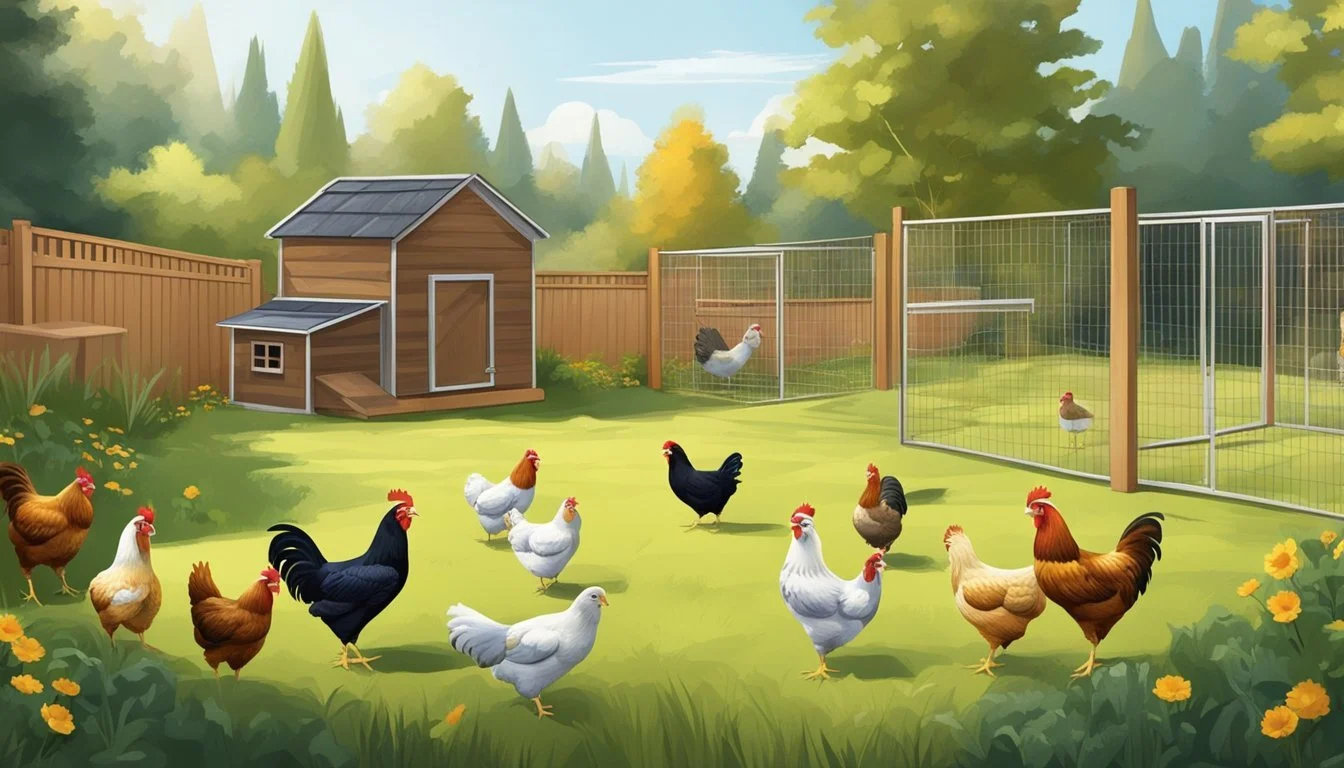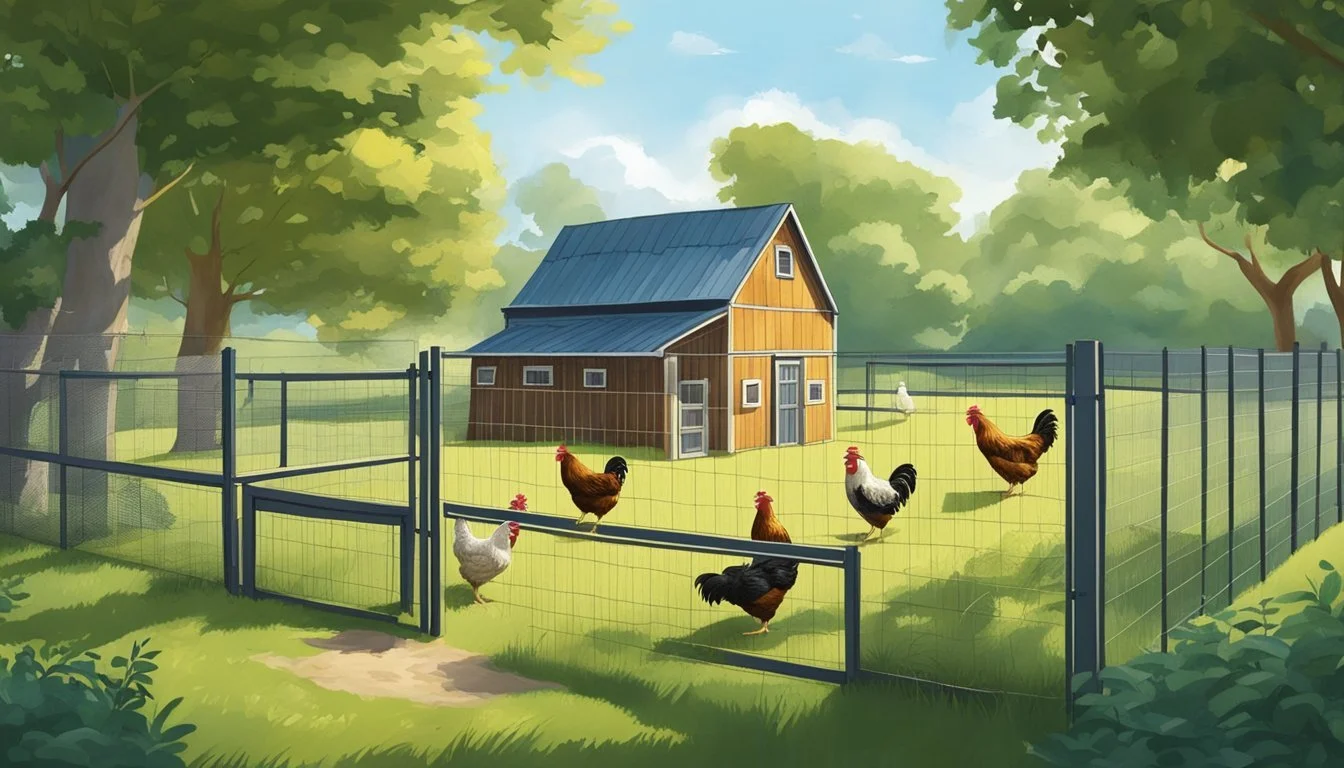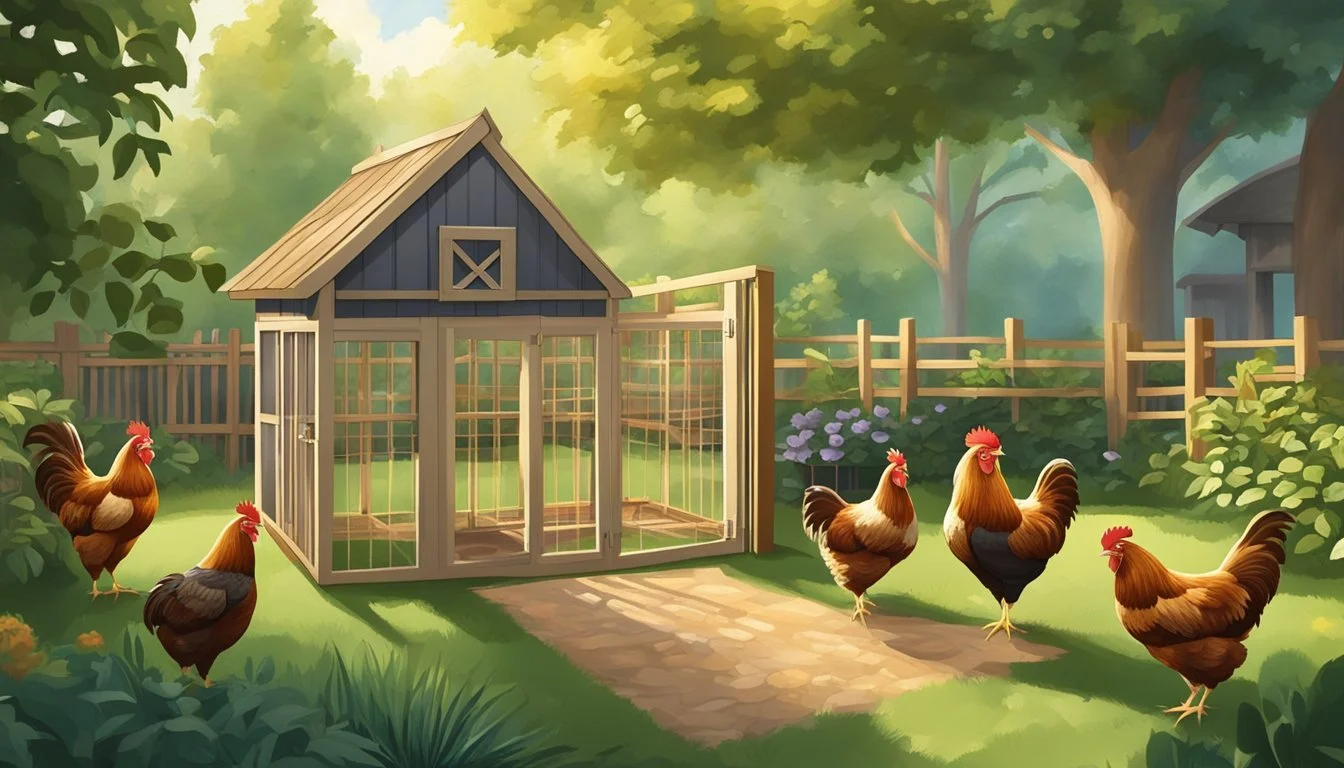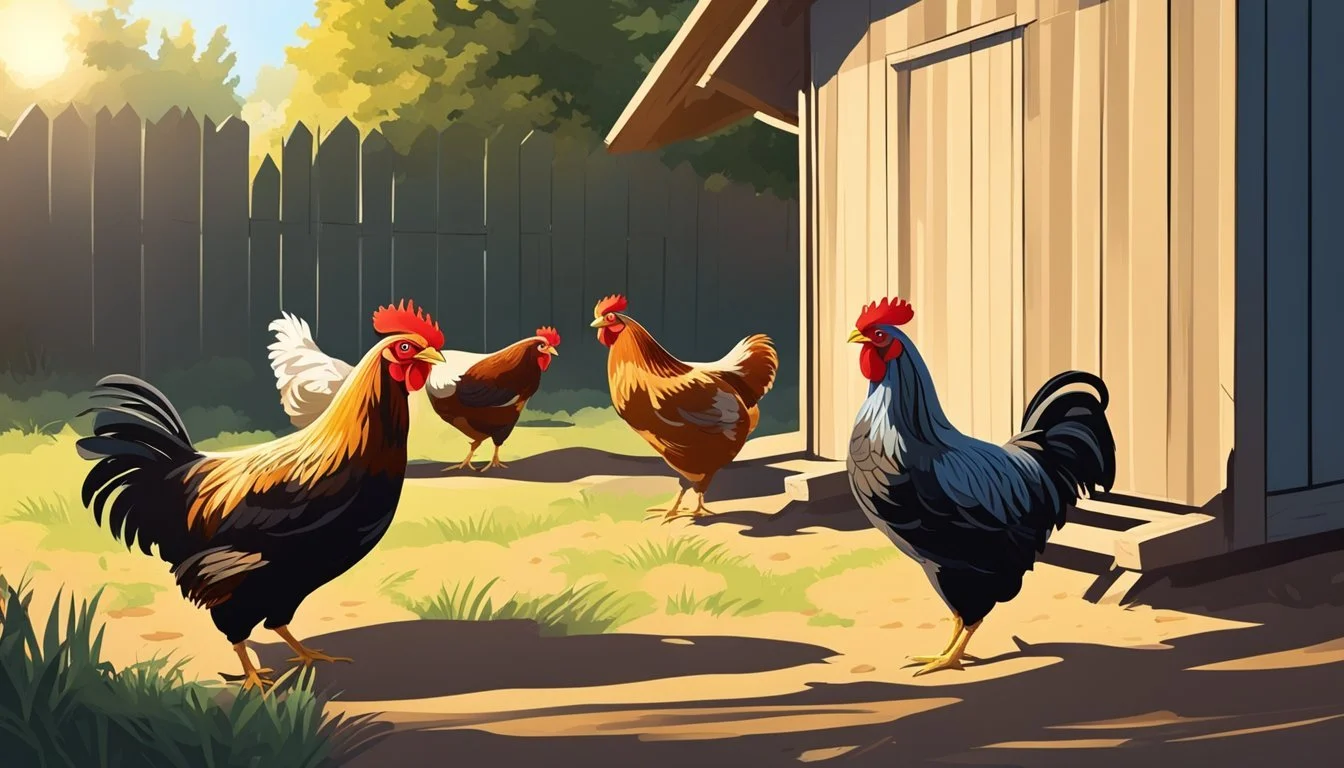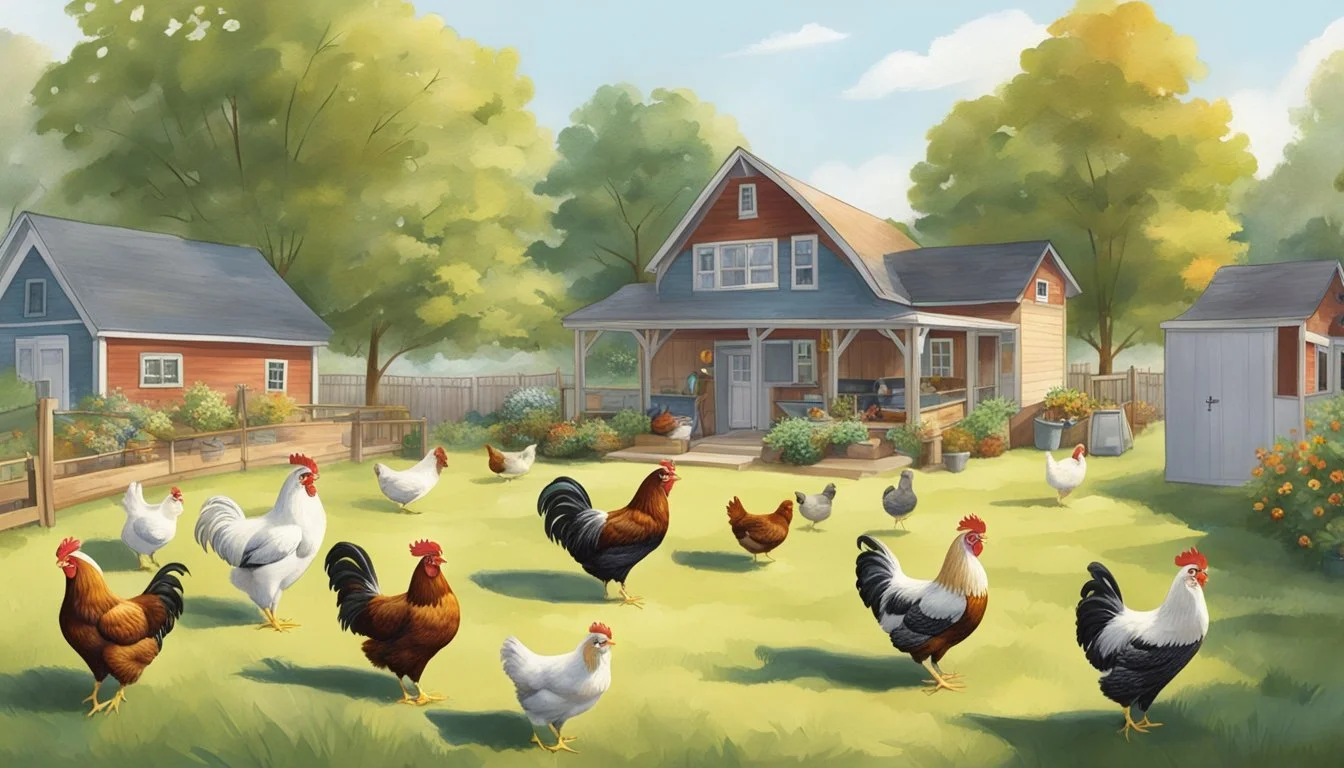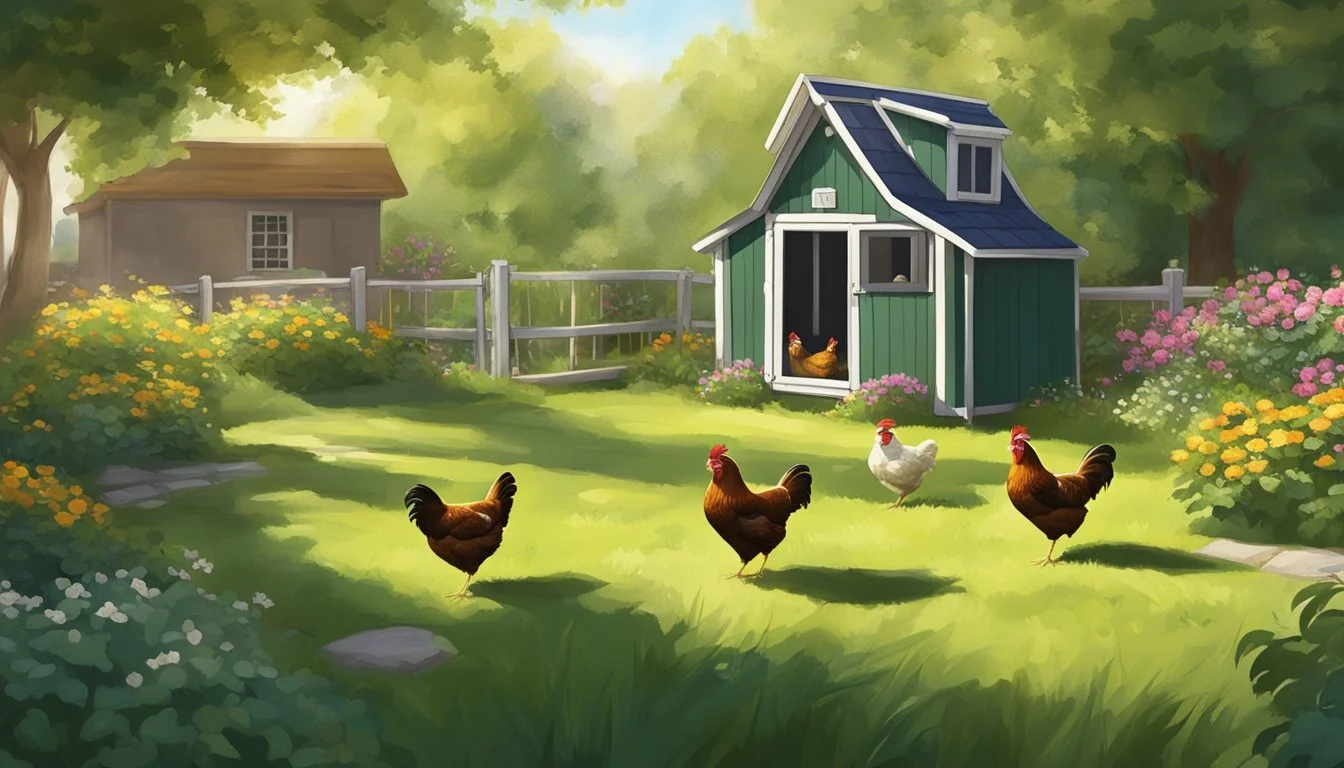Keeping Backyard Chickens in Columbia, MO
Essential Guidelines for Urban Poultry Farming
Keeping backyard chickens has become increasingly popular among residents in Columbia, Missouri, reflecting a wider trend in urban homesteading. Under city ordinance 020549, Columbia permits the keeping of chickens within its limits, a move embraced by those interested in sustainable living and local food sources. Urban dwellers in Columbia are leveraging their backyards for more than traditional gardening; they're creating spaces for these feathered friends to roam and contribute to household food supplies with their fresh eggs.
In Columbia, MO, aspiring chicken keepers must adhere to specific regulations to ensure the health and safety of both the chickens and the community. Enclosures are required to responsibly contain the birds, and these must be maintained in a clean and sanitary manner. It is essential that these structures provide chickens with adequate ventilation, sunlight, and shade, ensuring that their welfare is given precedence.
Coexistence with chickens in an urban environment such as Columbia requires consideration of both neighbors and the animals. It's essential for city residents to understand the local ordinances, the responsibilities and benefits of keeping chickens, and the best practices for maintaining a coop in an urban setting. By prioritizing the well-being of the chickens and the cleanliness of their coops, citizens can enjoy the pleasures and rewards of raising backyard chickens in harmony with their urban lifestyle.
Understanding Local Ordinances
In Columbia, MO, residents are bound by specific local ordinances pertaining to the raising of backyard chickens. These laws ensure the welfare of the chickens and address the concerns of the community.
Columbia Chicken Laws
The City of Columbia has established guidelines which prohibit the keeping of roosters but do not place restrictions on the breeds of hens that can be raised. Chickens must be confined within an enclosure or fenced area at all times. The City requires that all enclosures are maintained in a clean, orderly, dry, and sanitary condition to prevent odors and pests.
Key elements of Columbia's chicken laws include:
Roosters: Prohibited within city limits.
Hens: No breed restrictions.
Enclosures: Must be consistently well-maintained.
Permits and Property Requirements
When considering keeping chickens, individuals must be aware of both the permit requirements and property constraints outlined by local ordinances.
Permit requirements:
Zoning Approval: Initial verification with local zoning authorities is necessary to determine if an area is zoned for keeping chickens.
Permit Application: Depending on the local legislation, a permit might be required to legally keep chickens on one's property.
Property stipulations:
Enclosure Location: Must adhere to property line restrictions, typically requiring a certain distance from neighboring dwellings.
Size Regulations: Some local governments may impose limitations on the size of the chicken enclosure in relation to the property size.
By remaining informed about the local and state ordinances, residents of Columbia can ensure their backyard chicken ventures comply with Missouri's legal framework.
Setting Up the Chicken Coop
Creating a functional and secure chicken coop is essential for keeping backyard chickens healthy and safe. It involves careful location selection, designing an enclosure with proper ventilation, and establishing nesting areas for egg laying.
Selecting the Right Location
The ideal location for a chicken coop in a backyard should be on high ground to avoid flooding and should provide protection from strong winds. One must ensure that it gets ample sunlight to maintain a dry environment, as chickens require both sun and shade. Accessibility is also key for regular maintenance and egg collection.
Coop Design and Ventilation
A chicken coop must have secure latches as chickens are at risk from predators such as raccoons known to open many types of closures. The coop should provide at least 4 square feet of space per chicken if they have access to an outdoor run. Ventilation is paramount to keep the air fresh and prevent the buildup of ammonia from droppings. Properly designed vents or windows can help maintain good air circulation while keeping the coop secure.
Nesting Boxes and Egg Collection
Nesting boxes should be easily accessible both for chickens and for owners to collect fresh eggs. Ideally, there should be at least one nesting box for every three to four hens. These boxes must be kept clean and filled with suitable nesting material such as straw or shavings, encouraging hens to lay eggs in a designated area and making collection easier.
Choosing Your Chickens
When selecting chickens to raise in Columbia, MO, it's crucial to consider the breed's adaptability to the local climate, the purpose of keeping the chickens, and whether you'll be starting with adult birds or raising chicks.
Best Breeds for Columbia's Climate
Columbia's climate can vary, with warm summers and cold winters. Breeds that are hardy and can adapt to these changes are essential. The Wyandotte is a popular choice for its thick feathers that make it well-suited for colder temperatures. The Leghorn, known for its heat tolerance, is also a good option during the warmer months. Delawares, with their moderate size and good feathering, perform well in varying climates, making them an ideal candidate for Columbia's weather.
Egg-Laying vs. Meat Chickens
Chicken owners typically raise chickens for either eggs, meat, or both. For those prioritizing egg production, Leghorns are prolific layers, known for their large white eggs. If meat production is the goal, the Delaware breed is a suitable choice, as they grow quickly and have a good feed-to-meat conversion ratio. For dual-purpose, consider the Wyandotte; they provide a reasonable amount of both eggs and meat.
Raising Chicks
Raising chickens from chicks requires an understanding of the care they need to thrive. Starting with chicks allows for a stronger bond with the birds and greater control over their health from the beginning. Ensure they have a warm brooder area, proper feed, and clean water. Columbia residents looking to raise chicks should choose breeds that are known to be docile and hardy, making them easier to manage and less sensitive to environmental stressors.
Chicken Care and Maintenance
Caring for backyard chickens in Columbia, MO, requires attention to their dietary needs, clean living environments, and health management to prevent disease and promote well-being.
Feeding and Nutrition
Chickens need a balanced diet to remain healthy and productive. They should be provided with a complete chicken feed that meets their nutritional requirements, which can differ by age and purpose. For example, layers need feed with a higher calcium content to support egg production.
Starter feed: High in protein, suitable for chicks up to 6 weeks old.
Grower feed: Moderately high in protein, suitable for pullets.
Layer feed: Balanced for egg-laying hens, lower in protein but enriched with calcium.
Chickens also enjoy kitchen scraps and garden produce, but these should only complement the main feed and not exceed 10% of their overall diet.
Clean Water and Hygiene
Chickens require constant access to clean water. Water containers must be checked and refilled daily to ensure cleanliness and avoid the buildup of pathogens.
Daily cleaning: Rinse and refill water containers.
Weekly cleaning: Scrub containers with a mild detergent and rinse thoroughly.
The coop and run should be cleaned regularly to maintain hygiene and limit the risk of disease.
Remove droppings and leftover food daily.
Perform a deep cleaning monthly, which involves changing bedding and scrubbing surfaces.
Health and Disease Prevention
Regular monitoring is crucial for early detection of any health issues, which is essential for effective disease prevention.
Observation: Check for changes in behavior, appearance, and egg production.
Vaccination: Follow recommended vaccination protocols for the local area as some diseases are preventable through this method.
Maintaining a clean environment and providing nutritious food are the best ways to keep chickens healthy. Immediate isolation of any chicken showing signs of illness can help prevent the spread of disease to the rest of the flock. Regular veterinary check-ups are advised to ensure good health.
By considering these specific care elements, backyard poultry keepers in Columbia can ensure their chickens thrive.
Managing the Flock
When keeping a backyard chicken flock in Columbia, MO, understanding the flock's social structures and behaviors is crucial, as is ensuring their safety from predators and implementing effective rodent control. Many households opt to keep chickens as engaging pets within the bounds of urban agriculture, emphasizing harmonious and secure living conditions.
Behavior and Pecking Order
Each chicken flock develops a hierarchical system known as the "pecking order," which is essential for maintaining social order among the birds. Hens generally establish this hierarchy through various interactions, where certain birds assert dominance. In Columbia, flocks are usually small, so disturbances in the pecking order can be significant. Observing flock dynamics can aid in early identification of bullying or aggression, allowing for timely intervention to keep peace within the group.
Keeping Chickens as Pets
Chickens are increasingly appreciated as pets, offering interactive experiences for families involved in urban agriculture. In Columbia, where flocks tend to be small due to local ordinances limiting the number of hens to six, they can receive more individual attention. This facilitates bond formation between the chickens and their owners, but one must remain mindful that roosters are typically not allowed in city limits to prevent noise disturbances.
Predator and Rodent Control
Protecting chickens from predators is paramount, especially in urban environments where raccoons and birds of prey are common threats. Secure housing, such as coops with lockable doors and fenced runs with overhead coverage, deters most predators. Rodent control is also crucial, as mice and rats can be attracted to chicken feed. Storing feed in tightly sealed containers and maintaining a clean coop area can greatly minimize the presence of rodents, ensuring a clean and safe environment for the chickens.
Compliance and Considerations
When keeping backyard chickens in Columbia, Missouri, residents must be mindful of local ordinances and regulations that mandate the proper management of noise, odor, and handling of potential complaints or violations.
Noise and Odor Management
The City of Columbia requires that all chicken enclosures be maintained in a clean, dry, and odor-free condition to minimize any impact on the surrounding neighborhood. It specifies:
Enclosures: Must provide adequate ventilation, sun, and shade.
Maintenance: A regular cleaning schedule to ensure sanitary conditions.
Residents must take proactive steps to ensure their chickens do not become a nuisance through excessive noise or by emitting offensive odors.
Handling Complaints and Violations
If a resident's chickens become a source of complaint, Columbia's Animal Control or the Department of Health may intervene. The process is as follows:
Complaint Received: An official investigates the issue upon a complaint.
Violation Confirmed:
The owner is typically given a chance to rectify the violation.
Continued non-compliance may result in fines or the revocation of the right to keep chickens.
Residents must adhere to the local ordinances to avoid penalties and maintain good standing within the community.
Community and Resources
In Columbia, MO, residents find a supportive community and resources that help in maximizing the benefits of raising chickens in their backyards. From ways to monetize one's passion for poultry through selling eggs to engaging with the local community at educational events, the opportunities are diverse.
Selling Eggs and Local Markets
Residents of Columbia who keep backyard chickens have the option to sell eggs to neighbors or local markets, fostering a sense of community and sustainability. Local farmers' markets offer a platform for residents to sell their fresh, home-laid eggs, often with a greater appreciation for the effort involved compared to larger commercial outlets. This can be particularly fulfilling for those who have invested time in ensuring their chickens are raised on quality feed and have ample space to peck and forage in the grass.
Educational Workshops and Events
For individuals eager to learn more about raising backyard chickens, Columbia provides several resources. Educational workshops and events are conducted throughout the year by local farming organizations and poultry enthusiasts. These events can range from introductory sessions on the basics of chicken care to more advanced workshops on the intricacies of breeding and health management. Additionally, poultry shows allow chicken owners to connect, share experiences, and showcase their birds. Various online platforms, such as Pinterest, also serve as a repository of information, offering tips, designs for coops, and feeding strategies tailored to the backyard chicken community across the country.
Conclusion
Backyard chicken keeping in Columbia, Missouri, operates under clearly defined municipal regulations. As of the latest update, residents are permitted to keep up to a limit of six hens per tract of land; however, roosters are prohibited to mitigate noise issues.
Enclosure requirements stipulate chickens must be contained within an enclosure or fenced area, ensuring their safety and minimising potential nuisance. No particular breed restrictions are imposed, offering residents the flexibility to choose chickens that best suit their needs.
Health considerations are a significant aspect of urban poultry farming. Diseases such as Salmonella present a risk, underscoring the importance of maintaining good hygiene practices in handling chickens and their eggs.
In terms of suburban poultry farming, Columbia's approach is accommodating but ensures the welfare of both chickens and the community. Legislative evolution is ongoing, with dialogue between the Board of Health and residents aimed at refining the ordinance to reflect best practices.
The Columbia Department of Health remains a valuable resource for current and aspiring chicken owners in terms of compliance and education on safe and responsible chicken keeping within city limits.

